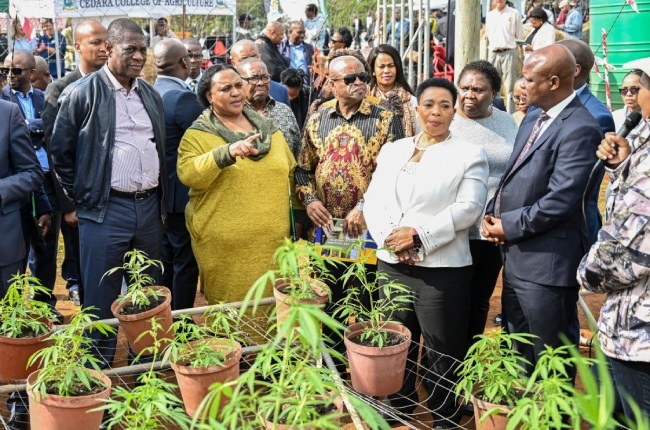
Prosperity, education, employment.
These are some of the things that the youth of South Africa hope to celebrate each June 16 as they commemorate the sacrifices and courage of the 1976 youth – many of them barely teens – who took a stand against apartheid and were mown down by bullets in a display of state violence that shocked the world.
While many lost their lives, others joined the banned anti-apartheid movement and committed themselves to activism within the borders of apartheid South Africa, while other went to exile. Still, others chose to accept the new Afrikaans language policy that was being imposed on them by the National Party government of then Prime Minister John Vorster.
June 16, 1976, is often spoken of as the watershed moment in the resistance movement to apartheid. Many young people were determined that their oppression by Afrikaans nationalists needed to be fought even if it cost them their lives.
The words that Nelson Mandela spoke during the Rivonia Trial in which he and other members of the MK high command faced charges of sabotage for which Vorster hoped they would receive the death sentence seemed to have been animated in them.
"During my lifetime I have dedicated myself to this struggle of the African people," Maiba had said, reading his statement from the dock at the opening of the defence case in the Rivonia Trial on 20 April 1964.
"I have fought against white domination, and I have fought against black domination. I have cherished the ideal of a democratic and free society in which all persons live together in harmony and with equal opportunities. It is an ideal which I hope to live for and to achieve. But if needs be, it is an ideal for which I am prepared to die."
This ideal led to the life imprisonment of Nelson Mandela, Walter Sisulu, Gowan Mbeki, Raymond Mhlaba, Elias Motsoaledi, Andrew Mlangeni, ‘Kathy’ Kathrada and Dennis Goldberg.
Rusty Bernstein and James Kantor were acquitted of all charges; Goldberg, the only white person convicted in the case, served his sentence in Pretoria; the other seven went to Robben Island.
The ideal spurred the youth of 1976 forward.
Prosperity, education, employment. The cornerstones of a good life.
Equality, dignity, freedom. The basic tenets of inalienable, universal human rights.
That's what they were fighting for.
Fast forward to today and the statistics today paint a gloomy picture.
Currently, 4,9 million of the country’s youth is unemployed, meaning 46,5% of the youth is without jobs.
One of the departments of the South Africa government that has been driving a notable change in youth employment, empowering women, and supporting emerging farmers is the ministry of Agriculture, Land Reform and Rural Development led by Minister Angela Thoko Didiza.
The minister speaks to Drum about how the Department of Agriculture, Land Reform and Rural Development (DALRRD) has been creating job opportunities for the youth, opportunities for vacant state land and empowering women.
Read more | Meet Free State farmer Thokozile Maphisa who has 50 hA of land, producing maize, beans, and livestock
In the past year, the department has allocated almost two hundred and fifty thousand hectares of land to youth, women, and persons with disabilities.
“There are programmes that target women, youth, and emerging farmers such as the land redistribution programme, this is done through the Proactive Land Acquisition Strategy, where the department allocates state land to beneficiaries for agricultural production purposes. Through this programme, last year, a sum of 244 796 hectares of land was distributed to 188 beneficiaries comprising of 107 women, 80 youth and 1 person with disabilities were allocated,” she tells Drum.
The department is also encouraging the youth to venture into the agricultural sector. Over the years, the DALRRD has been conducting career awareness campaigns to encourage, particularly youth, and share opportunities such as bursary schemes, to consider taking careers in agriculture.
Again, the department frequently conduct workshops for women, youth, and emerging farmers, where departmental programmes are shared with them thereby outlining the processes, criteria, and opportunities,” she explains.
In September 2010, the department launched the National Rural Youth Service Corps a core sub-programmed of the Comprehensive Rural Development Programme that has benefited over 890 young women, 1 599 youth and youth with disabilities were trained through this programme.
“The programme was introduced as part of a strategy to deal with the high levels of unemployment and curbing the skills gaps amongst rural youth. The aim of the programme is to develop a cadre of young people who would become change agents within their communities. The targeted youth would become a service platform for youth to participate in their own development and that of their communities, in providing them with skills needed to gain access to employment and other economic opportunities.”
According to the Minister, to date the programme has capacitated rural youth with various skills and facilitated their transition to meaningfully contribute towards vibrant, equitable and sustainable rural economies. It has also successfully trained 17 537 youth in various skills training programmes.
These training programmes have translated into 1 621 employment opportunities and 710 of these graduates are in business.T he department constantly tries to link the youth to economic opportunities, so far it has, “issued an invite to both the private and public sector to partner with the department so that they can meaningfully contribute towards youth unemployment.”
To support young farmers, the department has a Presidential Employment Stimulus Initiative that targets young subsistence farmers, and it is accessed using the USSD system where successful farmers are given vouchers, “over 100 000 youth have benefitted thus far,” she shares.
Smallholder farmers, including the youth can also use the Farmer Production Support Units which entails provision of support to maximise agricultural production, maintain their supply contracts, create jobs, enhance food security, stimulate agro- industrialisation and help to grow the country’s economy.
The department is currently in the process of finalising the Women and Youth Empowerment Strategies.
“The department has introduced various mechanisms to empower women, youth, and emerging farmers in the sector, such as the Beneficiary Selection and Land Allocation Policy which seeks to facilitate a process of unlocking access of land to special and targeted designated groups and Norms and Standards for Designated Groups seeks to influence key departmental programmes to mainstream women, youth and persons with disabilities according to set targets, including 50% of women, 40% youth and 10 % of persons with disabilities,” she explains.
Read more | 6 things Thoko Didiza wants to do in Tshwane
According to Didiza, more than 52 women and 28 youth farmers have been assisted last year through the Comprehensive Agriculture Support Programme.
“This programme provides post settlement support to the targeted beneficiaries of land reform and to other producers who have acquired land through private means and are, for example, engaged in value-adding enterprises.”
She adds that the programme provides:
- On and Off farm infrastructure support;
- Technical and Advisory Assistance;
- Regulatory Services;
- Training and Capacity Building;
- Marketing and Business Development;
- Information and knowledge management, and
- Financial assistance
A total of “4552 women, 1571 youth and 63 persons with disabilities were supported last year”, she shares.
The department also has a Ilima/Letsema (Fetsa Tlala) Programme, an integrated government framework that seeks to promote food security and address structural causes of food insecurity, which continue to perpetuate inequality and social exclusion.
The minister also shares that the department has a financial scheme that entails hybrid of grants and loans, with low interest rate incurred, that is provided to producers with annual turnover of 10 million.
“The department also supports support black-owned farming and agribusiness enterprises that were previously excluded to participate in the mainstream economic activities with the view of enhancing the transformation agenda in the sector,” says Didiza.
“To assist youth trained from 2010 to 2021 who were trained with no option of exit opportunities, a public invitation has been issued inviting the young people to submit information indicating their current status indicating whether they are employed, running their own businesses or unemployed," she adds.
"The young people falling under the unemployed category will be contacted by the department for purpose of upskilling and possible linkage to job opportunities.”




















